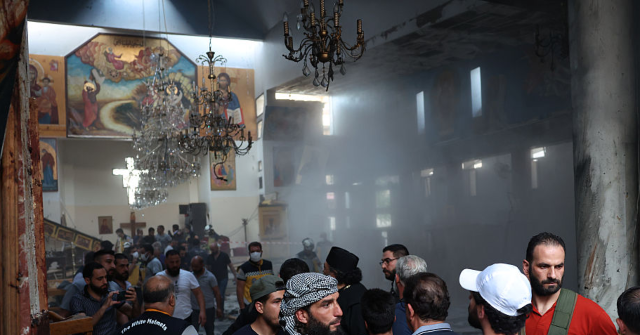A horrific gun and suicide bomb attack on a church in Damascus killed at least 25 people and wounded 63 more on Sunday, posing a stiff challenge to the ruling junta’s promise that it would make Syria safe for all ethnic and religious groups.
A masked gunman opened fire on the Greek Orthodox Church of the Prophet Elias in the Dweila neighborhood of Damascus during services on Sunday. The attacker detonated a suicide vest after shooting his way into the church. Some eyewitnesses reported seeing a second shooter during the attack.
There was no immediate claim of responsibility for the attack, but the Syrian Interior Ministry said the bomber was a member of the Islamic State.
On Monday, the Interior Ministry said that “a number of criminals involved in the attack” were arrested and explosive devices were seized in an operation near Damascus against “cells affiliated with the Daesh terrorist group.” Daesh is another name for ISIS.
Sunday’s horror was the first suicide bombing in a Syrian Christian church since the beginning of the brutal civil war in 2011, and the first terrorist attack in Damascus since the overthrow of dictator Bashar Assad last December.
Syria’s interim president, Ahmed al-Sharaa, promised his government would “work night and day, mobilizing all our specialized security agencies to capture all those who participated in and planned this heinous crime and bring them to justice.”
Sharaa said the attack “reminds us of the importance of solidarity, and unity of the government and the people in facing all that threatens our nation’s security and stability.”
“This cowardly act goes against the civic values that brings us together. We will not back down from our commitment to equal citizenship… and we also affirm the state’s pledge to exert all its efforts to combat criminal organizations and to protect society from all attacks threatening its safety,” said Syrian Information Minister Hamza Mostafa.
An Interior Ministry spokesman said, “the security of places of worship is a red line.”
The head of the Religious Affairs Advisory Office in Damascus, Abdul Rahim Atoun, said the attack was a “compounded offense” that “targeted a place of worship, which is inviolable,” while aiming to “incite chaos and destabilize security.”
“These are a series of crimes: prohibited by religious teachings, punishable by law, and rejected by the customs and values of our country. They constitute acts of corruption on earth, and those responsible should face deterrent penalties that prevent them and others from contemplating such thuggery again,” Atoun said.
The Greek Foreign Ministry condemned the “abhorrent terrorist suicide bombing” and demanded Sharaa’s government “take immediate action to hold those involved accountable and implement measures to guarantee the safety of Christian communities and all religious groups, allowing them to live without fear.”
“I demand that Ahmad al-Sharaa himself comes and investigates the attack, if he is really a president for this country and cares about Christians in this country,” the wife of one of the victims told reporters.
Father Malatios Shtayeh, who was present at the Mass on Sunday, criticized the interim government for failing to protect the church.
“We’ve never been used to asking for protection from anyone. We’ve always lived under the protection of God. But we are citizens of this country, and it is the duty of the state to protect us. This is not a privilege the state grants us: it is its responsibility,” he said.
ISIS has been attempting to regain its strength in Syria by exploiting the chaos of Assad’s ouster. According to the insurgent government, ISIS used photos of Sharaa meeting with President Donald Trump in Saudi Arabia in May as a recruiting tool, accusing him of straying from the path of jihad by seeking favor with the United States.
The government also says ISIS has been able to replenish its armory with weapons abandoned by Assad regime forces. Several officials hinted that loyal members of the Assad government could be working with ISIS to destabilize the new government.
The governor of Damascus, Maher Marwan, said from the scene of the crime that “remnants of the regime” were showing their “destructive hand in the region.”
Sharaa himself is a former member of al-Qaeda and ISIS whose rebel group rebranded itself as Hayat Tahrir al-Sham (HTS) several years ago, seeking to distance itself from its terrorist roots and refocus on the task of overthrowing Assad. HTS has a history of fighting ISIS during the seven years when it controlled territory in northern Syria, running an insurgent fiefdom known as the “Syrian Salvation Government.”
Sharaa made copious promises upon taking power in Damascus that while his government would remain Islamist in character, it would protect the rights of Syria’s many sects and would refrain from revenge attacks against groups seen as favored by the Assad regime — notably including Christians and Alawites, the offbeat sect of Shia Islam that Assad and his family belonged to.
Read the full article here


